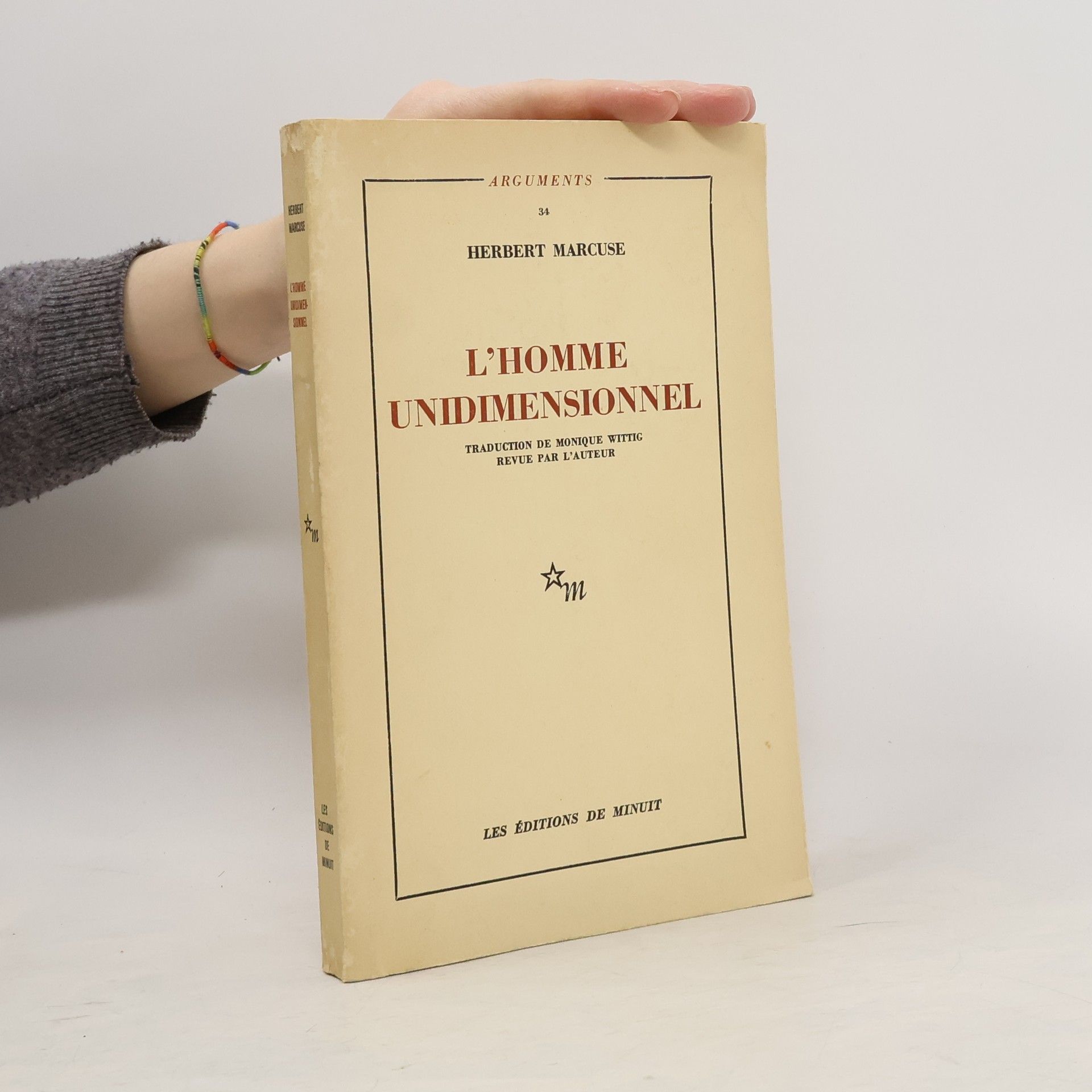L'homme unidimensionnel
Essai sur l'idéologie de la société industrielle avancée. Traduction de monique wittig revue par l'auteur
Philosophe, théoricien politique et sociologue germano-juif, il fut un membre éminent de l'École de Francfort. Célébré comme le « Père de la Nouvelle Gauche », ses contributions intellectuelles ont profondément marqué les mouvements étudiants et la pensée critique des années 1960. Son œuvre explore l'interaction complexe entre la répression et la libération dans la société moderne, examinant de manière critique comment le progrès technologique et l'industrialisation peuvent paradoxalement favoriser de nouvelles formes de subjugation. Il pousse les lecteurs à s'engager avec des idées stimulantes sur la liberté et la condition humaine.







Essai sur l'idéologie de la société industrielle avancée. Traduction de monique wittig revue par l'auteur
Collected Papers of Herbert Marcuse, Volume 5
The book features a collection of Marcuse's significant writings, showcasing his distinctive blend of philosophy, psychoanalysis, and critical social theory. It offers a comprehensive introduction by Douglas Kellner, Tyson Lewis, and Clayton Pierce, which contextualizes Marcuse's thought within the major philosophical movements of the twentieth century, highlighting his intellectual contributions and relevance.
Exploring the critique of capitalist modernity, this collection of essays by Herbert Marcuse delves into foundational concepts like liberalism and individualism, challenging their relevance in contemporary society. Written between the 1930s and 1960s, the work showcases Marcuse's materialist dialectical thinking and offers a profound analysis of the conditions shaping thought and action. It serves as an essential resource for emerging scholars and a compelling reminder for those familiar with critical theory, emphasizing the need for a rigorous critique of modern organized life.
Volume III of Herbert Marcuse's Collected Papers focusing on the New Left movement for whom he provided theoretical and political guidance. The new material collected in this and accompanying volumes provides a rich and deep grasp of the era.
Collected Papers of Herbert Marcuse, Volume 6
The collection features key works by Marcuse, showcasing his responses to traditional Marxist theories on revolution and utopia. It includes a thorough introduction that contextualizes his ideas within the broader landscape of twentieth-century philosophy, highlighting his engagement with significant philosophical movements. This compilation offers insight into Marcuse's unique contributions and critical perspectives on established Marxist thought.
This classic is Marcuse's masterful interpretation of Hegel's philosophy and the influence it had on European political thought. Marcuse brilliantly illuminates the implications of Hegel's ideas with the later developments particularly Marxism.
Collected Papers of Herbert Marcuse, Volume 2
This collection features unpublished manuscripts and letters from the late 1960s and early 1970s, highlighting Marcuse's critical theory of contemporary society. The work is enriched by an introduction from Douglas Kellner and an afterword by Jürgen Habermas, providing valuable insights into Marcuse's ideas and their relevance. The compilation offers a deep exploration of social critique during a transformative period in history.
The book explores the influence of Marcuse on the New Left, highlighting his significance as a theoretical and political guide for a younger generation of activists. It offers new material that deepens the understanding of the era, illustrating Marcuse's role in the key political and theoretical developments of the time. Through this examination, readers gain insight into the complexities of his thought and its impact on the movements of the day.
One of the most important texts of modern times, Herbert Marcuse's analysis and image of a one-dimensional man in a one-dimensional society has shaped many young radicals' way of seeing and experiencing life. Published in 1964, it fast became an ideological bible for the emergent New Left. As Douglas Kellner notes in his introduction, Marcuse's greatest work was a 'damning indictment of contemporary Western societies, capitalist and communist.' Yet it also expressed the hopes of a radical philosopher that human freedom and happiness could be greatly expanded beyond the regimented thought and behaviour prevalent in established society. For those who held the reigns of power Marcuse's call to arms threatened civilization to its very core. For many others however, it represented a freedom hitherto unimaginable.
The great theorist of radical liberation analyzes the relationship between authority and freedom.This is the first paperback edition of what is now recognized as Marcuse’s most important collection of writings on philosophy. He analyzes and attacks some of the main intellectual currents of European thoughts from the Reformation to the Cold War. In a survey that includes Luther, Calvin, Kant, Burke, Hegel and Bergson, he shows how certain concepts of authority and liberty are constant elements in their very different systems. The book also contains Marcuse’s famous response to Karl Popper’s Poverty of Historicism, and his critique of Sartre.